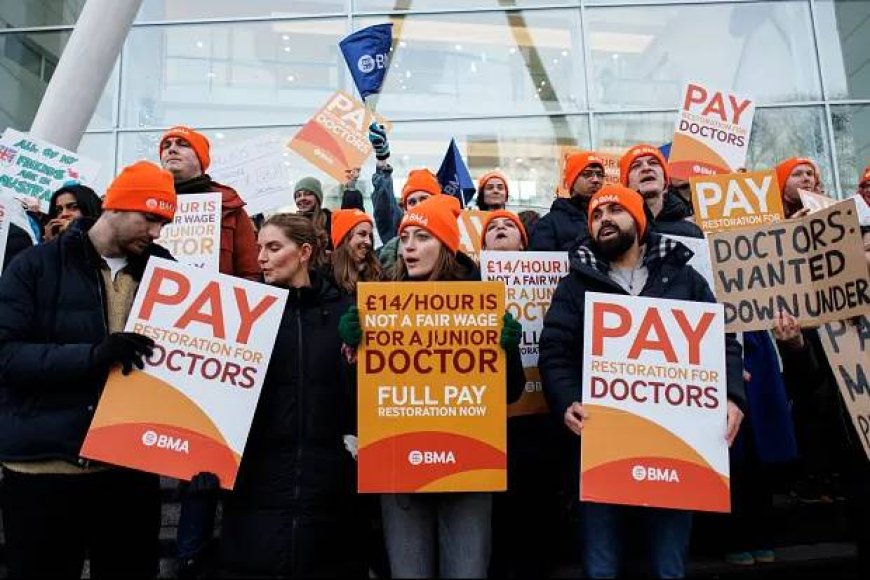The British NHS in Endless Turmoil: Sunak's Government's Policies Fuel Fresh Strikes
A recent strike, backed by Britain's National Health Service (NHS), has garnered significant attention across the United Kingdom. Commencing this Wednesday, junior doctors, the backbone of the NHS institution, have embarked on a strike in response to the protracted impasse between the British Medical Association (BMA) and 10 Downing Street. According to observers, the strike is set to persist for a span of three days, marking a momentous juncture for the NHS.

It is crucial to explore the utmost significance of junior physicians within the NHS structure before delving further into this imbroglio. These young physicians, having successfully traversed the halls of medical universities, are presently engaged in practical training within hospitals and medical centers. Astonishingly, this group constitutes nearly half of the medical practitioners within the UK’s NHS system. The BMA, an organization boasting a membership of 50,000 junior doctors, has laid down the gauntlet, announcing a six-day strike in January 2024, decrying the government's intransigence as an "unreasonable partner" in these negotiations. Should Rishi Sunak’s administration remain obstinate in their refusal to recommence talks on better remuneration, this strike would probably assume the mantle of the most protracted walkout in the history of the NHS. In the midst of this discord, Victoria Atkins, Secretary of State for Health and Social Care, has expressed her perspective, emphasizing that the NHS’s junior personnel must stand by the government in times of exigency. According to Atkins, the government believes that a new round of strikes would certainly preclude any resumption of negotiations with the BMA.
In a counterpoint, the physicians partaking in this strike have decried the cancellation of over 1.2 million medical appointments during the NHS strikes during the past year, branding the government's refusal to engage in further negotiations as an act of sheer madness. In this regard, Dr. Robert Laurenson, an eminent member of the BMA, has echoed this sentiment by asserting in an interview with Sky News that it is irresponsible for the conservative government to already possess an executive solution to the crisis yet fail to actively engage in negotiations, refrain from proposing solutions, and ultimately allow the strike to proceed. Although the government has tendered an offer of a 3% pay increase to junior doctors, a figure that supplements the independent pay review body's recommendation of 8.8% in April 2023, the BMA has vehemently contended that this offer, following years of meager pay rises that have failed to keep pace with inflation, essentially translates into a genuine pay cut for its members. The BMA posits that the only viable remedy to restore their members' salaries to 2008 levels lies in a substantial 35% wage hike.
On the other hand, Atkins, in defense of her government's stance, has contended that resorting to strikes as a means of redress is an ill-advised strategy, highlighting the fair agreements that have been reached through negotiations with various segments of the NHS, including specialist doctors and consultants. It seems that Atkins ardently desires that the so-called principles of justice and rationality (!) guide the ongoing negotiations with junior doctors. Dr. Laurenson, however, castigates the government's approach in negotiations with the BMA, lamenting their failure to cooperate with the association's members and avert the strike during an arduous year of continuous wage increase negotiations. Laurenson further asserts that the government's inaction has precipitated an exodus of British doctors seeking better financial opportunities abroad, thereby attributing full blame to the British administration led by Sunak. "For fourteen months we have been at odds, and deliberately we avoided strikes in the winter, and we started our action in March, and that was because we thought we could bring the health secretary to the negotiation table and fully elucidate our grievances,” added Laurenson.
It is worth mentioning that, according to the BMA, it took six months of this union's tenacious endeavor to finally compel the government to engage in negotiations in May, which culminated, after months of deliberations, in the present impasse. Amidst this acrimonious legal battle between the government and the BMA, key institutions and charitable organizations operating within the British health sector report a catastrophic and extremely complex situation confronting emergency departments across the UK. The Confederation of British Medical Services and the Age UK group have jointly issued a fervent plea for an immediate resolution, underscoring the formidable challenges inherent in delivering appropriate, safe, and effective services to patients during periods of strikes. British Prime Minister Rishi Sunak, in his latest comments on the junior doctors' strike, has conspicuously downplayed the grievances advanced by the BMA, questioning the rationale behind the doctors' refusal to embrace what is purportedly a widely accepted solution! While critics attribute the genesis of this crisis to the conservative government's abject failure to allocate sufficient funds to the healthcare sector, the Sunak administration, driven by neoliberal economic agendas, has pursued an unconventionally austere approach to address the calamity plaguing this vital sector. In conclusion, as the impasse between the government and the BMA persists, it is incumbent upon all 10 Downing Street to embrace the tenets of reason and put into consideration the welfare of patients and the professional aspirations of junior doctors, all of which hang in the balance, something that many observers believe will never come to reality.













































